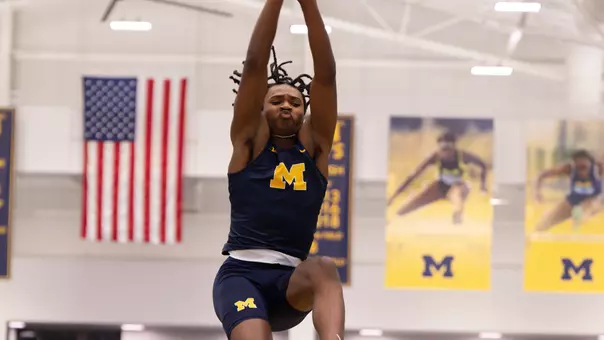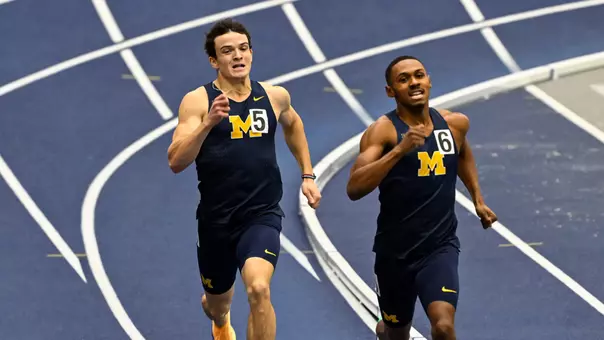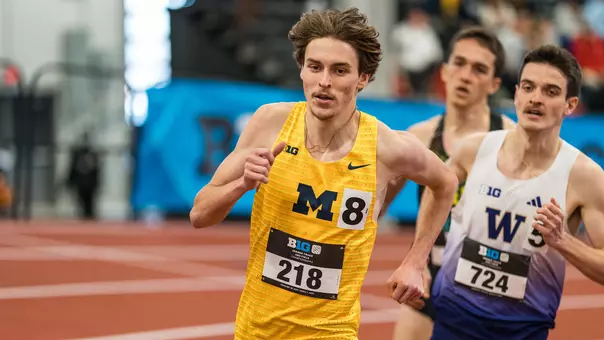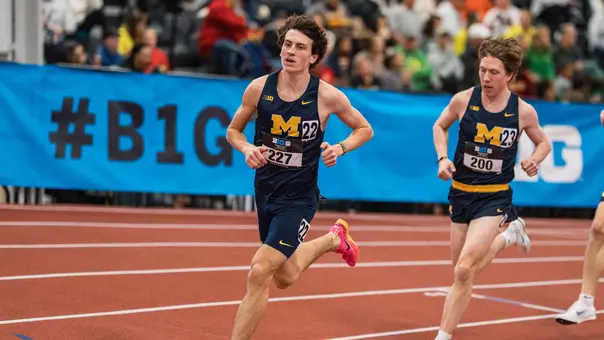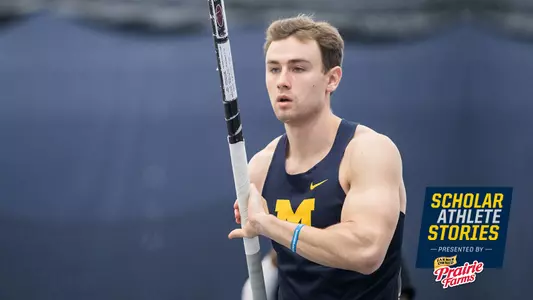
Scholar Stories: Data Drives Decathlete Lint
3/27/2019 11:21:00 AM | Men's Track & Field, Features
Continuing the popular series that began in 2016-17, each Wednesday MGoBlue.com will highlight a Michigan student-athlete and their academic pursuits. These are our Scholar-Athlete Stories, presented by Prairie Farms.
By Kyle Terwillegar
More than most other track and field student-athletes, University of Michigan graduate transfer student Jack Lint is all about the numbers.
Take the Big Ten Indoor Championships, held in Ann Arbor in late February, for instance. Lint competed in four different events measured in both seconds and meters. That included five hurdles, three horizontal jump attempts, six vertical jumps attempts and three throws -- all of which were assigned unique point values based on the quality of the performances to determine scores in an overall set of standings.
And that was just on Friday, Lint's first day of competition in the heptathlon.
Lint's signature indoor event runs student-athletes through a seven-event gauntlet over two days that tests competitors' prowess in sprinting, endurance, throws and jumps events. At the end of all seven, the competitors' scores from each are totaled together, with the highest point total taking the win as the best all-around athlete in the field.
Lint posted a score of 5,507 points that earned him fifth place overall, as well as the No. 3 spot on the all-time Michigan list in the event, in what was his first-and-only heptathlon while wearing the maize and blue.
The upcoming outdoor season will present even more numbers to deal with, as the decathlon expands Lint's two-day schedule to 10 different events -- five on each day. One hurdles race, two different sprints, three different throws events, three different jumps events and a 1,500-meter run to cap it all off.
It can be a lot to keep track of in the heat of competition -- not to mention a lot to train for throughout each week of practice -- but the analytical mind of Lint thrives in those circumstances.
"Most guys that I compete against that are successful, they're actually really smart guys," Lint said, "and they do understand the math and they want to understand what goes into each event and how physics or how certain stretch reflexes were actually working. Understanding all those different types of information can make you a better athlete, especially in the decathlon where you have to keep so much information straight in your head or on paper."
***
You can confidently count Lint among those successful and really smart guys.
Now in his first year at Michigan as a graduate student pursuing a master's degree in data science from the School of Information, the Ohio native arrived in Ann Arbor after decorated academic and athletic undergraduate careers at the University of Virginia.
He left as the Cavaliers' school record-holder in the indoor heptathlon and also won an ACC title in the event, and was an NCAA Outdoor Championships qualifier in the decathlon. All the while, he was twice bestowed national All-Academic honors by the U.S. Track & Field and Cross Country Coaches Association (USTFCCCA) while completing his studies in computer science.
"In computer science, everything is about solving problems across a wide range of complexity, and I think that that's kind of what drew me to it," Lint said. "Later on in my undergraduate coursework, I realized that a lot of the classes I was more interested in were more data-driven. They focused more on how to make decisions about something based on the data that we have and how to manage all these massive amounts of data that the world is accumulating."

With a desire to continue his education through graduate studies and still an additional year of NCAA eligibility available to him, Lint had options available to him around the country.
"I think the biggest thing for me was that if I was going to continue both athletically and academically, I wanted to go to a place that was really strong academically, first and foremost," Lint said. "Committing to a master's degree is not an easy task and it's definitely a lot of work, so I wanted to make sure that this was time well spent. I knew that going to Michigan and really doing anything there was going to be beneficial for me down the road."
***
With a full semester of both grad school and a complete (albeit slightly injury-interrupted) indoor season now under his belt, he is taking advantage of what Michigan has to offer on both the academic and athletic fronts.
Through his coursework, Lint is preparing to take on some of the promises and challenges that come with a world that is increasingly ever-dependent on data and information.
"I think that people don't really understand how much logic and how much complex mathematics goes into writing software and that it's not just simple little things that make websites go," Lint said. "Whether it be autonomous vehicles or other emerging technologies, it's hard to fathom how much time and energy and research goes into just coming up with the types of equations that are necessary to then start to write the programs that go into those projects.
"I think data is going to be used in ways that people don't even understand yet. It's just going to happen in their lives and then they're going to feel like this all came together with what seemed like a snap of the fingers, but it's really been going on in the background for more than 20 years."
His career aspirations in the field are still coming into focus as the world of data and information continues to rapidly change around him.
"I know I want to be a data scientist or a data engineer who works on complex problems that involve large amounts of data and who can help people however I can," he said. "I don't have one set industry I want to be in as of yet, but I think I'll find that when the time comes."

Beyond the classroom, the data-driven decisions shift to issues like how he and coach Jenni Ashcroft are to best utilize a 20-hour weekly practice limit to sharpen his skills in 10 different events -- especially more technical events like the hurdles and pole vault -- while also allowing time for other activities like warm-ups and weightlifting.
"No two weeks are the same," Lint said. "It's really about what meets we have coming up or what we need to focus on that's been going well or that's been going poorly. That all plays into it."
He credits Ashcroft and a large network of support at Michigan with being able to help him achieve and maintain the right balance.
"I think my favorite thing at Michigan is just how engaged and connected the coaches are with the team and how much you can tell that they really care about the student-athletes' success," Lint said. "Not just the coaches but really everyone, including the athletic trainers and all the support staff that we have. They're really giving student-athletes the best opportunity to succeed, and I think that that sets Michigan apart from a lot of other places."
Even with how busy his schedule becomes with his dual roles as a graduate student and a decathlete, Lint -- though not a veteran of the Michigan program -- often takes time to pay forward that support and share insights with his younger teammates.
"Being an older guy on the team, I've had a lot of experience that some of the freshmen or sophomores might not have had just yet," he said. "So it's nice to be able to give back in that way. And I think that that's something I'll continue to do after all my life."
All of Lint's practice and all his analytics will be truly put to the test for the first time this outdoor season when he makes his Michigan decathlon debut at the Arizona Jim Click Shootout on Thursday and Friday, April 4-5.
"Indoor season had some hiccups with some injuries, but I finished Big Tens as well as I could have asked for, and now we're getting ready for outdoor and I feel pretty good," he said. "It's going to be a fun season."

